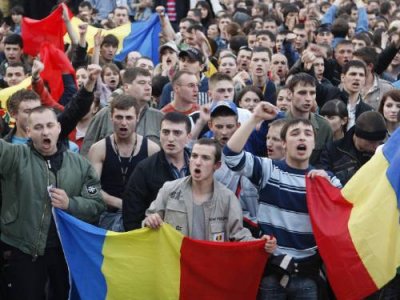 The prime minister of Moldova said on Thursday that authorities in the former Soviet republic were prepared to use all means including weapons, if new opposition protests turn violent.
The prime minister of Moldova said on Thursday that authorities in the former Soviet republic were prepared to use all means including weapons, if new opposition protests turn violent.
Zinaida Greceanii, in a television address to the nation, said the opposition was planning to stage new rallies on Friday and Sunday against the Communist Party’s election victory last weekend and warned that the rallies could lead to casualties.
“Organisers of the biggest crime in Moldova’s history are preparing tomorrow and on Sunday to again use our children to organise a rampage in the government building,” she said.
“If we allow this, it will be difficult to avoid casualties. Police will use all means to protect Moldova’s constitutional order, including weapons,” she added.
Thousands of pro-Western demonstrators looted and set fire to the parliament and the president’s offices in central Chisinau on Tuesday. They alleged rigging in elections whjich gave the ruling Communist party nearly half the vote.
Veteran communist President Vladimir Voronin accused neighbouring Romania of trying to stage a coup. Moldova has imposed a visa regime on Romania, expelled its ambassador and denied entry to more than 19 Romanian journalists.
Romanian Foreign Minister Cristian Diaconescu described Moldova’s actions as discriminatory and the imposition of visas as “reckless”.
After at least 193 people were arrested in Tuesday’s riots, the European Union urged Moldova to drop punitive measures against Romania and respect constitutional freedoms.
OPPOSITION PARTIES SHAKEN BY VIOLENCE
The streets of Chisinau were generally quiet on Thursday as the opposition parties, shaken by the scale of Tuesday’s violence, pondered their next move.
Opposition leaders have tried to distance themselves from the violence. They said people had been receiving messages on their mobile phones and via the Internet about a new protest on Friday, but they dissociated themselves from it.
The Liberal party, which won 12.75 percent of the vote in the disputed parliamentary election, called on the European Union to send a special mission to investigate the riots.
Located on the European Union’s border but within the former Soviet space that Moscow sees as its sphere of influence, Moldova has the potential to enflame EU-Russian relations. Those were already upset by last August’s Russia-Georgia war and the disruption to Russian gas flows to Europe in the New Year.
Wary of becoming embroiled in a new dispute with Moscow, the EU’s Executive Commission said the bloc fully recognised Moldovan sovereignty. The foreign ministers of three EU states — France, the Czech Republic and Sweden — urged Moldova to “resume normal relations with Romania”.
In Moscow, Russian Foreign Minister Sergei Lavrov said he was “deeply disturbed” by Romanian flags and slogans at Tuesday’s riots because they showed that the demonstrators “were obsessed with the idea of destroying Moldovan statehood”.
Most of present-day Moldova, Europe’s poorest country, was part of Romania until Stalin annexed it to the Soviet Union in 1940. It won independence when the Soviet Union fell in 1991.
Voronin says Romania wants to seize control of his mainly rural country of 4 million people, where the average monthly salary is $250. Romania has dismissed the accusations.
Voronin faces a growing economic crisis as thousands of Moldovans working abroad lose their jobs in the global economic crisis and stop sending home vital hard currency remittances.
Some Moldovan opposition figures say the Communists were behind the violence as part of an attempt to distract the population from Moldova’s economic woes. The Central Election Commission has rebuffed opposition demands for a recount.
 Eurasia Press & News
Eurasia Press & News
